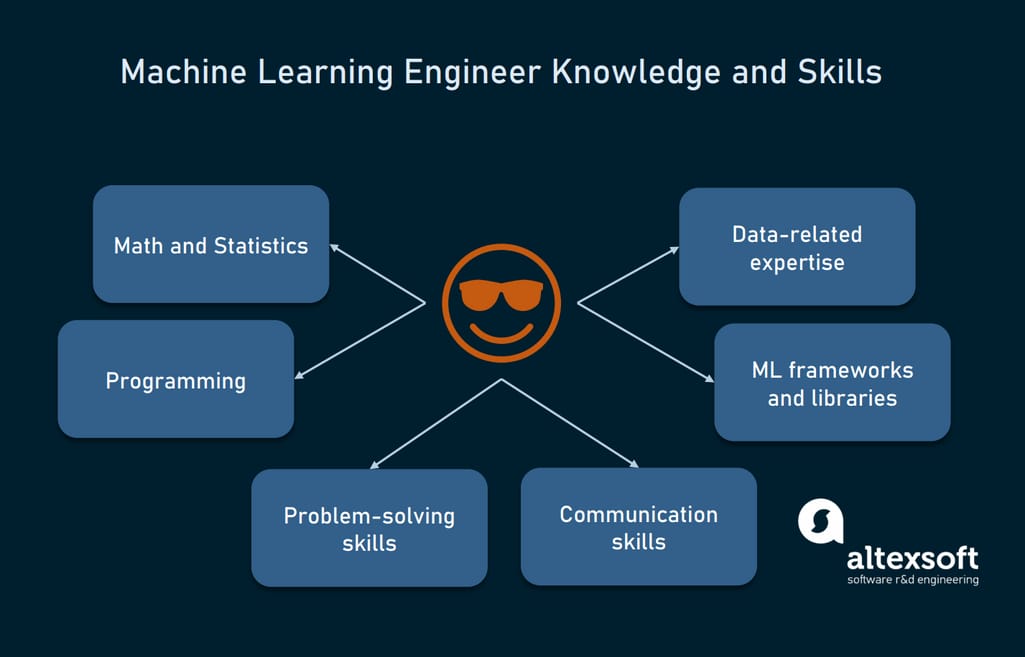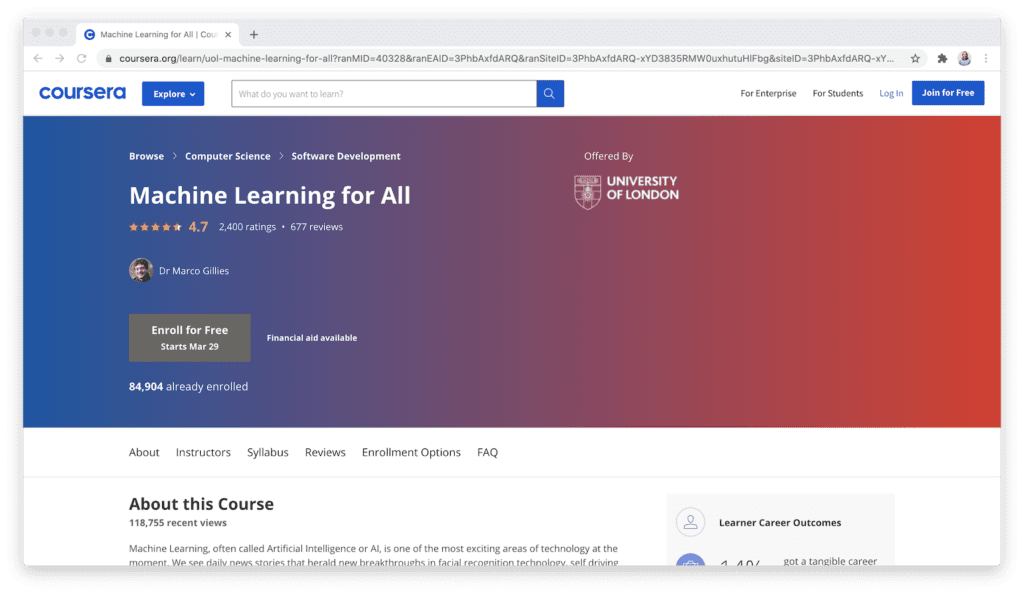All Categories
Featured
Table of Contents
- – The Ultimate Guide To From Software Engineerin...
- – Get This Report about Leverage Machine Learnin...
- – All About Aws Machine Learning Engineer Nanod...
- – The 2-Minute Rule for No Code Ai And Machine ...
- – Some Known Details About Advanced Machine Le...
- – How To Become A Machine Learning Engineer - ...
My PhD was the most exhilirating and tiring time of my life. Suddenly I was bordered by individuals that can solve tough physics inquiries, recognized quantum mechanics, and might create fascinating experiments that got released in leading journals. I really felt like a charlatan the entire time. But I fell in with an excellent group that encouraged me to check out points at my own pace, and I invested the next 7 years finding out a lots of things, the capstone of which was understanding/converting a molecular characteristics loss function (consisting of those painfully discovered analytic by-products) from FORTRAN to C++, and creating a slope descent regular straight out of Numerical Dishes.

I did a 3 year postdoc with little to no artificial intelligence, just domain-specific biology things that I really did not locate interesting, and ultimately handled to get a task as a computer scientist at a nationwide laboratory. It was an excellent pivot- I was a principle detective, meaning I could make an application for my own gives, compose documents, etc, however didn't need to show classes.
The Ultimate Guide To From Software Engineering To Machine Learning
Yet I still really did not "obtain" equipment knowing and intended to work somewhere that did ML. I attempted to obtain a work as a SWE at google- underwent the ringer of all the tough concerns, and eventually obtained denied at the last step (thanks, Larry Page) and mosted likely to help a biotech for a year prior to I ultimately procured hired at Google during the "post-IPO, Google-classic" period, around 2007.
When I reached Google I swiftly looked with all the tasks doing ML and located that various other than ads, there truly wasn't a great deal. There was rephil, and SETI, and SmartASS, none of which appeared also remotely like the ML I had an interest in (deep semantic networks). So I went and focused on other things- finding out the dispersed technology under Borg and Titan, and understanding the google3 pile and production environments, primarily from an SRE point of view.
All that time I 'd invested on artificial intelligence and computer infrastructure ... mosted likely to creating systems that loaded 80GB hash tables into memory so a mapper might calculate a small part of some gradient for some variable. Sibyl was actually a dreadful system and I obtained kicked off the team for informing the leader the ideal way to do DL was deep neural networks on high performance computer hardware, not mapreduce on low-cost linux cluster makers.
We had the information, the algorithms, and the calculate, all at when. And even better, you didn't need to be within google to take advantage of it (except the big data, which was changing swiftly). I understand sufficient of the mathematics, and the infra to ultimately be an ML Designer.
They are under extreme stress to obtain outcomes a few percent better than their collaborators, and after that once released, pivot to the next-next thing. Thats when I generated one of my legislations: "The very ideal ML models are distilled from postdoc tears". I saw a few people break down and leave the market permanently just from working on super-stressful tasks where they did magnum opus, but just reached parity with a competitor.
Imposter disorder drove me to conquer my imposter syndrome, and in doing so, along the means, I learned what I was going after was not really what made me pleased. I'm far more satisfied puttering regarding utilizing 5-year-old ML technology like things detectors to improve my microscope's capacity to track tardigrades, than I am trying to end up being a famous researcher who uncloged the difficult problems of biology.
Get This Report about Leverage Machine Learning For Software Development - Gap

I was interested in Equipment Discovering and AI in college, I never had the chance or perseverance to go after that passion. Currently, when the ML field expanded tremendously in 2023, with the latest developments in large language versions, I have a terrible wishing for the road not taken.
Scott speaks regarding how he ended up a computer science degree simply by adhering to MIT curriculums and self researching. I Googled around for self-taught ML Engineers.
At this point, I am not certain whether it is feasible to be a self-taught ML engineer. I prepare on taking programs from open-source courses readily available online, such as MIT Open Courseware and Coursera.
All About Aws Machine Learning Engineer Nanodegree
To be clear, my objective right here is not to build the next groundbreaking version. I simply intend to see if I can get a meeting for a junior-level Maker Learning or Data Engineering work after this experiment. This is purely an experiment and I am not trying to transition into a role in ML.
I intend on journaling about it once a week and recording every little thing that I research. One more disclaimer: I am not going back to square one. As I did my bachelor's degree in Computer Engineering, I understand several of the principles required to pull this off. I have solid background expertise of single and multivariable calculus, linear algebra, and statistics, as I took these programs in college regarding a years back.
The 2-Minute Rule for No Code Ai And Machine Learning: Building Data Science ...
I am going to focus primarily on Maker Knowing, Deep discovering, and Transformer Architecture. The objective is to speed run through these initial 3 programs and get a strong understanding of the fundamentals.
Since you've seen the program referrals, below's a fast guide for your discovering maker finding out journey. Initially, we'll touch on the requirements for most device finding out programs. Advanced programs will certainly require the following expertise before starting: Direct AlgebraProbabilityCalculusProgrammingThese are the general parts of being able to recognize just how equipment discovering works under the hood.
The initial program in this checklist, Equipment Learning by Andrew Ng, has refresher courses on a lot of the mathematics you'll require, but it could be testing to discover device discovering and Linear Algebra if you haven't taken Linear Algebra before at the very same time. If you need to clean up on the mathematics called for, take a look at: I 'd suggest finding out Python since most of good ML training courses utilize Python.
Some Known Details About Advanced Machine Learning Course
In addition, an additional exceptional Python resource is , which has lots of free Python lessons in their interactive browser atmosphere. After finding out the prerequisite essentials, you can begin to actually recognize how the algorithms work. There's a base set of algorithms in artificial intelligence that everyone ought to know with and have experience utilizing.

The training courses detailed over consist of essentially every one of these with some variation. Understanding exactly how these methods job and when to utilize them will be critical when tackling brand-new projects. After the essentials, some advanced techniques to learn would certainly be: EnsemblesBoostingNeural Networks and Deep LearningThis is just a beginning, however these algorithms are what you see in several of the most interesting equipment discovering services, and they're useful additions to your tool kit.
Understanding machine finding out online is challenging and extremely fulfilling. It is very important to bear in mind that just seeing video clips and taking tests does not imply you're truly learning the product. You'll learn a lot more if you have a side project you're dealing with that uses different information and has various other purposes than the course itself.
Google Scholar is constantly an excellent location to start. Get in keywords like "equipment knowing" and "Twitter", or whatever else you have an interest in, and struck the little "Develop Alert" link on the left to get emails. Make it a regular habit to read those signals, scan with papers to see if their worth analysis, and then commit to recognizing what's taking place.
How To Become A Machine Learning Engineer - Exponent Things To Know Before You Buy
Device understanding is extremely delightful and amazing to find out and explore, and I wish you found a training course above that fits your very own journey into this amazing field. Artificial intelligence makes up one part of Data Scientific research. If you're additionally thinking about discovering stats, visualization, data evaluation, and much more be certain to check out the leading data scientific research courses, which is a guide that follows a comparable style to this.
Table of Contents
- – The Ultimate Guide To From Software Engineerin...
- – Get This Report about Leverage Machine Learnin...
- – All About Aws Machine Learning Engineer Nanod...
- – The 2-Minute Rule for No Code Ai And Machine ...
- – Some Known Details About Advanced Machine Le...
- – How To Become A Machine Learning Engineer - ...
Latest Posts
The Easy Way To Prepare For Software Engineering Interviews – A Beginner’s Guide
The Best Strategies For Answering Faang Behavioral Interview Questions
The Best Engineering Interview Question I've Ever Gotten – A Real-world Example
More
Latest Posts
The Easy Way To Prepare For Software Engineering Interviews – A Beginner’s Guide
The Best Strategies For Answering Faang Behavioral Interview Questions
The Best Engineering Interview Question I've Ever Gotten – A Real-world Example